Tales of hope, tales of despair
By Dinesh Wagle in Achham, western Nepal
Wagle Street Journal
[This article appeared in today’s Kathmandu Post. Nepali version of the same appeared in today’s Koseli of Kantipur]
Photos by Wagle. Photos of Wagle by David Geoffrion

When I saw him for the first time walking on the dusty Karnali Highway leading to Jumla in Dailekhi land, the image of “Afghan Girl”, a famous photo by photojournalist Steve McCurry, popped in my mind. In the picture published on the cover of National Geographic Magazine in 1985, the Afghan refugee girl Sharbat’s eyes and face reflect immense pain and fatigue. I saw the same pain and fatigue on Rajesh Shahi’s face.

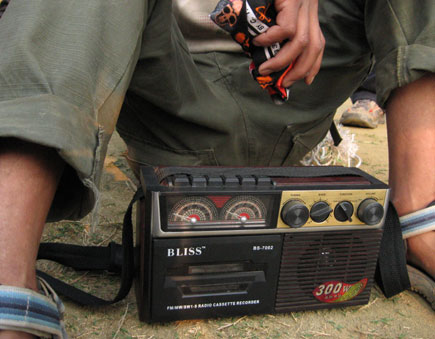
Tired of mixing gravel and sand at a construction site in Nainital, India, the 17-year-old was heading back home. He has been walking continuously for the last five days after crossing the Nepal border at Mahendranagar. His luggage, a green tin box held up by a tumpline, rubs against his back. A radio cassette player hangs from his neck and rests on his chest. Around 10 other people walk alongside Rajesh Shahi carrying similar belongings. They are all equally tired. All of them, before embarking on this journey home, had worked as laborers for a daily wage of Rs 120 Indian at a cricket stadium construction site breaking stones and mixing sand. They have all endured the reprimand of the Indian contractor, been intimidated by Indian Police at the border and some even robbed by them.
After reaching Khitki Jyula in Dailekh that February evening, they wanted to forget it all.
“There atop that hill is our home,” one of them pointed it out. The next morning, as they step into Achham district after crossing the Karnali River over the suspension bridge, they’ll reach their homes in time for lunch.
Before that happens, above the Karnali River and in a jungle below the village, an important piece of work will be done.
And even before that, there is another thing to be done at a shop in Jyula. Before leaving home for India, Rajesh had bought a jacket costing Rs 350 from the shop on credit with the promise to pay the money on his return. God save the boy, he is broke!
“All my earnings were spent getting back home, Dai,” the young lad who had stepped outside the shop to spit told me. “I bought some goods at Chisapani, this box, the radio; and I had to eat on the journey.”
The original plan was to cover the uphill distance on the other side of the Karnali before the sun was up, but Rajesh couldn’t convince the shopkeeper to let him go. The discussion lengthened, the morning was slipping away. “He is a shopkeeper of the village. I told him I’d pay him after reaching home, but he doesn’t listen,” Rajesh said. Finally, an older man among the returnees paid the money for Rajesh with the condition that he be repaid when they got home. The group continued its journey uphill. In a little while, they reached the river. One and a half hours from this place is Rajesh’s school in Bhaichala, Shree Sharada Primary School. Five minutes from the school, he reaches home.

Jeevan Shahi, 19

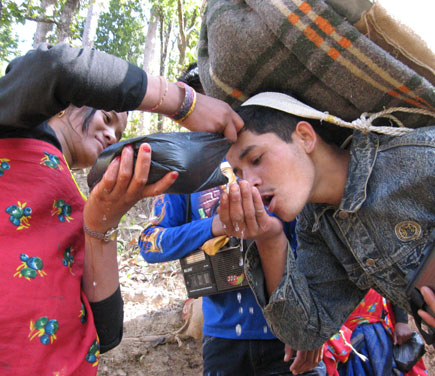





Jaisara Rokamagar, 16, with her friends
He laid down his luggage like his travel companions. He washed his hands and legs and dried them with a handkerchief. Then he opened the Chinese lock on his box. He slowly took off his old and worn-out jeans and jumper. He got into a new pair of jeans, fastened a belt around his waist and then put on a T-shirt. I saw a smile on his face for the first time after he changed into the colorful jeans which looked like a nine-year-old’s birthday gift. “Vacation” it said in big bold letters on his green T-shirt, and below it “In Goa Beach”. The words “Great Paradise” were overprinted on “Vacation”.
“Great Paradise Goa Beach” is a place in the country he labors in is something Rajesh doesn’t know. Nor does he have any plans of “vacationing” there. He just seemed too happy to be able to relax in the hills, his own hills.
“My heart is filled with joy, Dai,” he told me with a second’s gap after each word. “I’m about to reach home. I need to look good. I need to be fashionable. I should look good when I see my family.” He looked at me for a while, then at himself. He adjusted his T-shirt.
Rajesh’s travel mates and fellow villagers, 18-year-old Jeevan Shahi and 19-year-old Min Bahadur Bohara, also changed into new jeans, shirts and shoes. A little way above them, four girls carrying baskets were resting on their way uphill. Their laughter and jokes could be heard where the boys rested.
Now it was time to play at full blast the “Bliss” brand radio cassette player they had bought at Chisapani for Rs 900 which has FMs, medium wave and medium wave frequency from 1 to 9.
Shhhh as the wind blows
I wish to pluck the flower like youth
Far above the river as the girls were nearing all the three radios blared at one pace at once. Their volumes were raised. All the three of them were airing romantic tunes but they faced the same problem-you couldn’t figure out which cassette was playing which song in particular. It felt as though a fourth song was being aired from the mixture of the three.

Jaisara

Jaisara’s friends
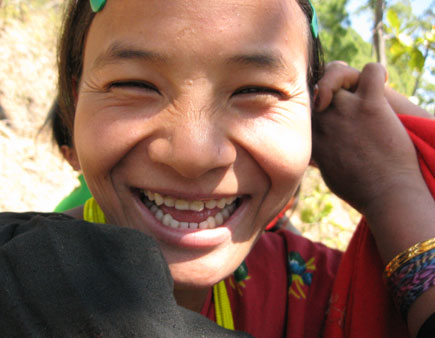


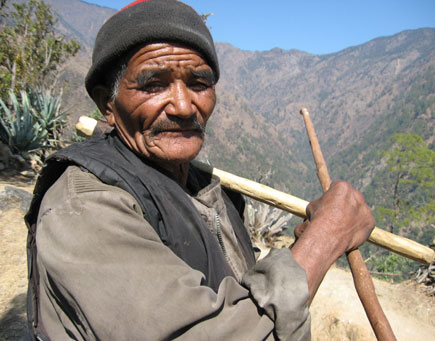
The girls who had been carrying water in a plastic bag offered it to the ‘thirsty’ boys. As they gulped the water in through their palms the boys’ eyes met the girls’. Two cassettes had been turned off, another one was airing a sad song-
Nor you or me could see
This sadness written in our fate….
The girls moved on. When we met them again in Batase hill they were yelling “Oie, Oie” to the truck drivers on the move in the hills of Dailekh opposite the Karnali River. All the four of them sat in a row swinging their legs. They were waiving their majetras to the drivers.
“What is the name of the one who fed me water?” I asked.
“Why do you need to know?” she replied.
“Just for the sake of it.”
“I have no name.”
“Come on, tell me,” I urged.
“Why should I? Why should I tell my name to a stranger?”
“I am your very own. We are from the same country.”
“Even a person living in a different house is a stranger. You are from a different district altogether.”
I had to try for another couple of minutes in order to make the cheerful, red-cheeked 16-year-old Jaisara Rokamagar disclose her name and age. Jaisara and her friends have never been to school.
Jeevan Shahi, however, had attended school till the third standard. Then his educational journey got caught up with the People’s War. “The situation did not favor me,” he said in a solemn tone. “’You must become a Maoist or else we will kill you and throw you away’, the Maoists told my father,” he said. The first time his father took him to India, Jeevan was 13. This lad who thought the Maoists to be the number one culprits behind his lack of education added that his parents’ illiteracy was also a cause.
“How nice it would be if my parents had educated me,” he said. “I would also be doing a job like yours.”
Surely, manual labor in Indian cities is not easy. Rajesh, who was returning home from India for the third time, explained, “Immediately after reaching the place you need to look for a contractor. You need to find out if he gives you the amount you earn or cheats you. Then there is the work. You need to figure out how easy or difficult it will be. After that you need to rent a kamara (room) and buy chawal (rice) and atta (flour).”
Just like bringing chawal in the kamara, these laborers bring in Hindi terms into their villages. “Say bhat (rice) now,” the hotel owner had told Rajesh after he had asked for a second helping of chawal at dinner the day before. As people with different languages and of the different societies move to and fro, some words create confusion among them and it often becomes a matter of jokes.
“Once, a contractor told a Nepali from here ‘Arey, kuladi leke aanaa’ (Arey, bring a kuladi with you),” one of them said. “The Nepali fellow looked around and saw nothing. So the next day, dragging a calf he went up to the contractor and said, ‘Dekho, maine kuladi laya’ (Look, I have brought a kuladi). The contractor was utterly surprised. In Hindi, kuladi means axe.”
Let’s leave the jokes in the jungle. After walking for five hours, Rajesh is about to reach home. He arrived at the aagan of his house after dodging an angry buffalo. His mother sits on the other side of the aagan.
“Did you meet your brother?” It was the very first question his mother asked him.
No. Rajesh’s brother who had left for India for a laborer’s job last year is not in contact with his family.
“I had told him not to go too,” 55-year-old Dudhkaladevi Shahi pointed to Rajesh and told me, “There is work in the fields. We have buffaloes. Who will take care of them?”
“I don’t like to work in the fields,” Rajesh who didn’t speak in front of his mother said. “How can I stay idle here? You should go to India.”





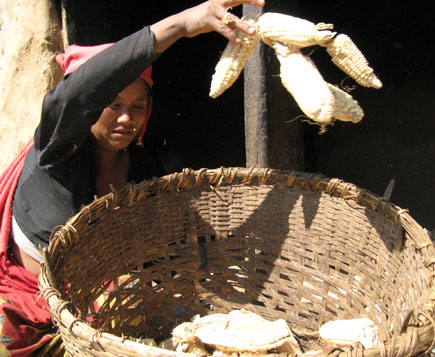

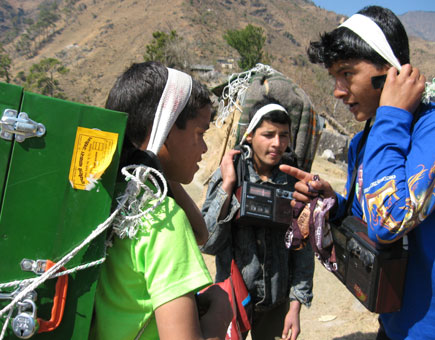



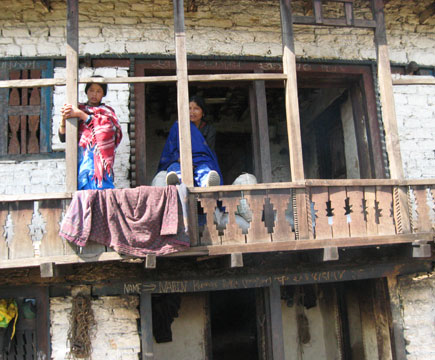
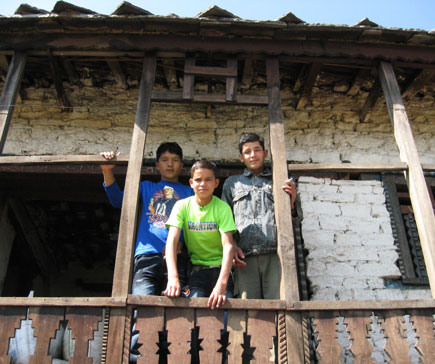
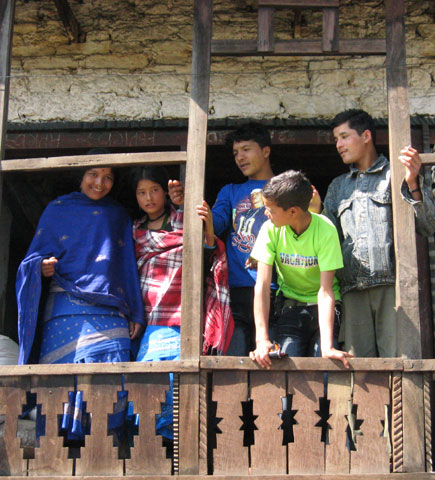
The mother’s negativity towards her son’s working in India seemed to change when Rajesh took his trunk to the inner room and opened it. He had brought a fariya, material for a blouse, shoes for his small nephew, clothes for his father and another fariya for his sister-in-law.
“We had nothing to wear, we were naked,” Dudhkala said with a bright face, examining the cloth for a while and then putting it back in the box. “What use is staying here, there is no money. We can’t buy clothes.”
We stepped outside. I looked at Rajesh’s face. I can’t explain how happy he was to see his mother’s happiness. He reminded me of the American photojournalist Steve McCurry’s photo once again. How would he have captured the happiness in the boy’s face? I wondered.
It was already late afternoon when I returned after waving goodbye to the mother and son. It was cold and windy. Rajesh shivered in his Goa Vacation T-shirt, but he wouldn’t put on his old, worn-out jacket over the T-shirt despite my repeated requests.








Comments
34 responses to “Homecoming of a Nepali Migrant Worker from India”
very nice
real story of hilly parts of nepal
Unfortunately, it is has become the story of all rural villages in Nepal. Even worse, is that it not a new story and we all have known about it for generations, but we have not been able to change it.
it’s a fact abt nepali and about the people of rural village.And also the story of whole nepal and nepali.
Bravo Wagle,
Great article and thanks for brining these stories to us.
All the news about Nepal is so KTM centric that we have forgotton the rest of Nepal.
You need to stay off politics (as you have no clue what you are talking about) and concentrate your efforts and on such stories.
true story of Nepal.
There are thousands of youth exploited by moist to join their party. Who will listen them? Neither do “Wall President” Puspa Kamal Dahal
This is a really heartbreaking story. But the truth is that, this is happening every day in our country and a daily story. It is mostly the ppl living in the remote parts of Nepal who go through these similar situations.
This is a really heartbreaking story. But the truth is that, this is happening every day in our country and a daily story. It is mostly the ppl living in the remote parts of Nepal who go through these similar situations.
Thanks to Dinesh ji for publishing these and similar articles.
?? ?????? ? ???????? ?????? ?? ?????? ???? ?? !
??? ???? ????? ?? ????? ???? ?????? ?
i’m surprised………. i’m not seeing nepali…….uff sorry !
i was waiting for yours article from long time wagle. u were lost for a awhile . Now i find out that u were in trip to Asham.
any way , i love your way of story telling …….
real image of nepal……… life is not easy anywhere……….. survival of the fittest………… try n try until u die………..
Nice story, this story and the pictures demonstrates the real situation of Nepal and the people. So agonizingly truthful… you feel so helpless by seeing this.. and the immense class difference amongst the Nepalese
Thanks for writing Great karnali ka kura and even it is interesting that u spent the whole valentine month on the remote hill. Hope , the research on the story seems so much hardworking & touchy….
ani ………khaeko 🙂 pani ta chiso nai thiyo hola ni hoina karnaliko?……………….
🙂
true picture of nepal !
This is the reality of Nepal behind the concrete jungles. For people from villages, this is what they have to face from early childhood and the story also revolves around one of them too.
Till when will the politicians get over their private issues to focus on the people living in the remote parts of Nepal?
This is a heartbreaking but true story of nepal. god knows when will these kind of situations be over???
great photo and great story about our nepal.you should keep posting these kind of story frequently.we must do some thing for these poor people .
I was wondering why this blog is getting boring day by day with the articles from other author only. We can see complex articles in daily newspapers and other websites. This is not what this blog should be doing. And now I am happy that wagle has returned to his original shape. Never leave the originality wagle..keep it up…The article was really really really good.
INNOCENCE LOST Poverty drives these people to leave their beautiful homes and family in search of so called greener pastures. God made Nepal one of the most beautiful country in the world.. To balance that it has put some of the most oppressive and corrupt leaders to handle the affairs of Nepal. What Nepal needs is visionary leaders who can feel the pain and suffering of the common Nepalese.
bahdai badhai ani dhanyabaad…Great job Wagle!
Very simple story with a deep insight to the countless lives in the hills of Nepal.
I loved the tons of pictures…sad but true. I liked the reference to the Afghan girl.
What I thought about as I read through this article:
1. a strong desire to help them…not knowing where to start
2. it made me aware about the things that i take for granted around me even though I’ve seen all this and grew up knowing this….point I’m making: these articles are sometimes motivating to those of us abroad to push the limits, if you will, and continue doing what we came here for: learn/work and make ourselves worth the many sacrifices our families have made.
3. awe…like somebody pointed out here, life in the hills have not changed for decades in Nepal! But it’s soothing to know that there are young-teenage-men with respect and love for their families and the country.
We all know that this is the story of..heck, the entire country! But just the simplicity of this article is awesome. Wagle, keep on writing more besides all the political stuff we get all the time. Mostly what we get fed by the news about Nepal from abroad are: CA polls, petroleum price hike strike, and CA polls. Not that those are not important but this would a great place to get ‘news’ (articles, pictures and such fun stuff) from all corners of the country and perhaps relate the story that to the political situation.
Wagle Brother , I salute you . The tragedy talks.Words are worthless !!! I again salute you. I will talk to you someday about all this!!
Heart warming..
Great great job Dinesh Jee. Your writings privides an window to see “KARNALI”. And, try to write more about ” Karnalies” in other parts of Nepal.
wow! What a story!!!! As someone has pointed out earlier, your way of describing things is just priceless!! Hats off to you!
What a painful story!
Congratulations Dinesh!
Your article captured the reality of the Western remote villages of Nepal in almost the same way as Steve Mc. Curry captured the reality in his famous ‘Afghani Girl’.
Below are few lines that touched my heart for I think they reflect the reality and tragedy of these people and all the Nepalese at the same time:
1. “had worked as laborers for a daily wage of Rs 120 Indian at a cricket stadium construction site breaking stones and mixing sand” {that’s less than $3.00 and they have to leave their home, their country to earn that}
2. “They have all endured the reprimand of the Indian contractor, been intimidated by Indian Police at the border and some even robbed by them” {Thats the story of every border. And the biggest tragedy is, even if they are able to hide some money from the Indian Police, Nepalese who have hotels in these borders try to rob them and are successful many times}
3. “God save the boy, he is broke! ” {And he was supposed to return back with some money and pay all the debts}
4. “He got into a new pair of jeans, fastened a belt around his waist and then put on a T-shirt. I saw a smile on his face for the first time after he changed into the colorful jeans…… I need to look good. I need to be fashionable. I should look good when I see my family.” {Fashion is a big thing, even in the remotest part of Nepal.No wonder, people in the capital city waste so much money in it and will do anything and everything to earn that money. }
5. “This lad who thought the Maoists to be the number one culprits behind his lack of education added that his parents’ illiteracy was also a cause.” {The never ending cycle of illeteracy in Nepal}
6. “Just like bringing chawal in the kamara, these laborers bring in Hindi terms into their villages.” {And Nepali language buries somewhere deep inside}
7. “I don’t like to work in the fields,” {Is being a labor in another country better than working in your country, just because no one can see what kind of work you were doing outside and so you can boast about the money you earned when you get back to Nepal? It’s not only about working in India, it applies for America and many other countries too.}
8. “The mother’s negativity towards her son’s working in India” {No mother wants to see her children leaving the country. Not even our mother land Nepal 🙂 }
And lastly I was wondering, if “Poverty drives these people to leave their beautiful homes ” then WHAT DRIVES EDUCATED PEOPLE TO LEAVE THEIR BEAUTIFUL HOMES AND THEIR BELOVED COUNTRY? AND HOW CAN WE BRING THEM BACK HOME, CAUSE NEPAL REALLY NEEDS THEM.
I forgot to mention it in my earlier post. This is the first time I am reading any article from this website or from the author. However, I really appreciate the author’s hard work and sincerity behind this article.
The views I expressed in the last post are the views of one person seen from one perspective. I realize that with every new person there is a new perspective and I respect all of them.
True story of Nepal.
There are thousands of youth exploited by exploitation by SAHU “landowner & Merchants” specially they are connected to our great parties Nepali Congress & RPPs & CPN UML .
who will do something for them. NC & UML??? No NO NO never. they will not . they will again corrupt our nation & leave no possibility of job for common people.
Who will listen them? Neither do GIRIJA (marna nasake ko budo, desh ko bojh) nor MAKUNE (madhav kumar nepal)
New Leader for New Nepal
It’s just by pure accident I stumbled upon this blog,
Good post by Mr. Dinesh Wagle!! Kudos!!
Me an Indian here and have seen quite a few nepalis around my locality (mostly as really hard working daily wage labours and security guards). Of course the are a few who are persuing Engineering in my college and you guys will be glad to know that they have a keen desire to give back something to their country(something that we call as ‘Swades’ movement)
I really feel the future of your country is in good hands.
lol
I truely admire and appreciate your work.
It tells the tale of a youth at remote parts of our country but in fact it reflects the situation at all strata of Nepalese society. If you generalize the key points, it fits perfectly to the people who have left for US/Australia/UK… from cities.
And what about thousands of other who dont return?
I solemnly pray that the situation gets better.
Bravo mister Dinesh !
I ve just read your story. A story already sheared with you. What a pleasure to see our fiends again on this blog for a democratic Nepal.
I feel my eyes full of tears to see again our little friend fof this “fucking” road. So many memories… So much humanity and sufferings in the Rajeh’s portrait.
Go on Dinesh, go on working for your beautiful country.
See you again soon.
David
[…]Thanks for sharing your work with us! Your theme is just awesome![…]
thanks for showing the reality struglist life thanks karnali
i have watched this documentary on australian network. it’s awesome. i will never get on those truck passing through that high way. i will rather walk.
it’s a poor …….